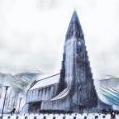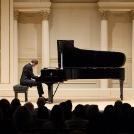Leaderboard
Popular Content
Showing content with the highest reputation on 07/12/2022 in all areas
-
Hi Peter, I just took notes as I was listening, so I apologize if these comments seem poorly organized. I think your texture could perhaps be more varied. You maintain a tutti texture the whole time. The suite is only five minutes long so it doesn't get tiresome, but varying the thickness would provide more interest (to me). I'm curious; how did you choose names for each of the pieces? The violas will hate you for their part in Melting Glacier. Just kidding 😉. BUT--see if you can't maintain your balanced texture whilst making the parts more engaging. The musicians that perform your music will love you for it. The Veldt was my favorite movement. Not only did you redeem yourself for the violas, but the thematic material was also the most engaging for me. Really well done here! In Mountain Climb, you might consider notating the time signature as 3 + 2 + 3 / 8 with a switch to 4/4 when the rhythm construction changes. The length of the measure won't change, but the meter you're going for will be clearer to the score-reader. With the horns, it seems like this could be better to score for one horn and one trombone/tuba/euphonium, depending on the desired timbre. Going from what I’ve read in orchestration textbooks (😂), the low horn has a very exhausting part that might be much more effective on a lower-pitched brass instrument. Regardless of how you do that, make sure you make it clear which player is playing at what time (you know, with 1, 2, or a2). Also: don't forget that wind instruments need to breathe! I've never touched a marimba, so I could be totally wrong here, but the places where you have a tremolo and a melody seem like they could be on the too-challenging side, even with four mallets. In terms of engraving, the score was really easy to follow; nice job with that. Do watch out when you're notating two instruments on one staff. Sometimes there were a few collisions (mostly in the horns). Overall, I really enjoyed the suite! It had a lot of charm and freshness that was helped along by the thematic consistency. I have one overarching comment for you that I touched on earlier: the texture, while balanced and put together well doesn't really vary, even from piece to piece in the suite. You do a good job of making up for that with thematic, rhythmic, and motivic interest, but re-orchestrating a little bit wouldn't hurt. Don't just vary the orchestration while maintaining tutti, though. Maybe you could give out a few solos, or give the melody to a lower instrument for a bit. A little more variance in terms of texture would go a long way towards improving this piece. I really hope that these comments didn't come off as too harsh. You did a really nice job with this suite and I look forward to seeing more of your work in this genre!1 point
-
Hey there, welcome to the forums! This is wonderful, and your performance really brought this to life. You're a very talented pianist, so thanks for the live recording. I gave this a few listens, and I'll touch on some of your requested thoughts. I would say your overall pacing and your craftsmanship were my favorite parts. You timed your moments of drama and dynamics perfectly, always building up to powerful sections without anything feeling out of place. It never felt boring, and it was really coherent throughout it's entirety. Theme's were well-developed and executed and all that. I felt like the texture had a constant heaviness to it, so maybe sprinkling in some spots with less pedal or being in the higher register would have done some justice. Could be the recording I suppose, but it's pretty damn good for a phone recording. Your score is ridiculously clean, it was very easy to read and follow. I always struggle with engraving, so it was nice to learn a bit from reading yours. Floating ties are fine, but not sure if I saw anywhere that would need three staves. Loved the ending Reminded me of Schumann songs, maybe some Rachmaninoff heavier spots too So this is my overall comment. As Tónskáld mentioned, your style is embedded in the romantic period (just going off of this, not sure of your other pieces). If that's your passion with music, then by all means keep exploring it's possibilities. But if I were you, absorb ideas and inspiration from some of the composers and styles of music that existed past that realm to further help you grow. I love what you're doing, I love the drama and passionate music of this piece, and it's one that I'll come back to. But explore jazz, or ragtime, or edm, or rock, or Debussy, etc. etc. to continue to build your own unique voice that separates you from the rest. You're obviously a gifted composer and great performer, so give the audience a reason to listen to you rather than Schubert and Chopin. You can keep your romantic bedrock while also peppering in some chord changes found in later eras, or maybe explore later forms with a romantic twist. I'm not saying you should join a bluegrass band, but just keep an open ear out for the other styles to amalgamate into your own voice. Like I said before, I'm a fan of your music! Wonderful performance here, and definitely don't be shy around here. There's loads of great musicians on this site that if you gave a few thoughts on their music they almost surely would return the favor. I'm really happy to have come across your music, and even more excited to hear how your sound continues to evolve and what you have in store for us next.1 point
-
The fluidity of the music. The thematic development here was nothing short of masterful, with themes reemerging in new textures, rhythms, dynamics, voices. There was never a dull moment. Predictability was perfectly balanced with the unknown. I didn't objectively dislike anything about this piece. What I found myself wishing for, however, was more adventurous harmony. For the most part, we stayed within the chord degrees of any given scale (F minor, C major, etc.), with a notable exception being the "Meno mosso con abbandono" section (fabulous, that). The traditional harmonies you employed were not detrimental to your piece overall, however; it just happened to be what I dislike the most. My favorite theme emerged at m. 109. It has a distinct freshness to it, unmuddied by all the bass chords the other themes tended to have. If I were forced to choose a least favorite, I suppose I would say the opening theme because of the aforementioned muddiness. But I still enjoyed the theme. No problems with the engraving here. Although I did notice an expression text ("delicato") sneak above the staff at m. 61. (I am now certain that you are rather fond of expression texts smattered throughout your score.) Perhaps some suggested fingering at m. 57-58 would be helpful. I personally do not think three staves was ever necessary. Oh, and there is a random "molto" at m. 56 — not sure what it's supposed to be modifying. Not even a little bit. These are, of course, relative terms, and the whole piece was relatively consonant. Still, for the Romantic idiom in which you wrote, much more dissonance would've ruined the idiom; therefore, I would say that the balance you struck worked very well for this piece. I thought it was well-placed. No complaints. It's obvious you play piano and are very good at it. This has translated over into your compositional abilities for the instrument. The writing here is perfectly idiomatic for piano, quite successfully done in the idiom you chose. Personally, however, I am wary of pieces that are melodically right-hand-heavy (and a reason I have a problem with Chopin). I'd like to see a piece that is a little more balanced in sharing melodic material between the hands. Once upon a time, I listened to Chopin. And I won't even pretend to know what the ballade form is. Decidedly Chopin, maybe a touch of Lizst. Leave Romanticism in the 19th century. You have a strong grasp of how music fits together; I encourage you to explore non-tertian harmonies and non-diatonic scales. They may sound terrible at first, but I think, little by little, you'll find how you can incorporate bits of them without compromising the style you're going for. The important thing is that you write music you like. It may very well be possible that Romanticism is where your composer's heart is and you'll never leave it. That's perfectly fine. My suggestion is still to explore a little, expand your palette, stretch yourself. That said, this is a beautiful piece of music — one that I think would fit well in the concert pianist's repertoire. Keep up the good work!1 point



